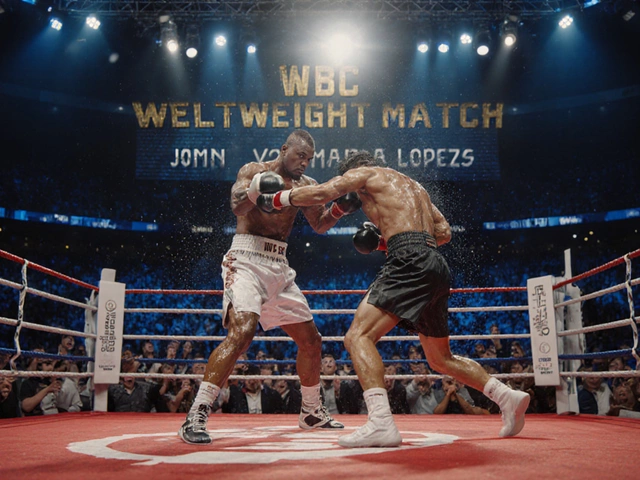
Football May 20, 2025
Why Do Americans Say Soccer? Unpacking the Word's Odd Journey
Ask any American why they say 'soccer' instead of 'football,' and you're likely to get a shrug — or maybe a heated debate. Americans never just decided on a whim to use a weird word. There’s actually a whole story behind it, filled with stubborn habits and a dash of British invention.
Most folks think 'soccer' is a uniquely American creation, but that's actually not true. The word was first used in England, of all places. So before anyone blames the U.S. for coming up with odd terms, it’s worth looking at where the name actually comes from. Turns out, two very different sports were splitting off way back in the day, and that little twist set the stage for years of confusion — especially when chatting with friends overseas.
If you’re a fan who flips between European and American games, you'll run into this word barrier all the time. I’ve had conversations where I said 'football' and someone thought I meant the NFL. Ewan, my son, can never believe folks outside the States don’t use 'soccer.' Knowing the real background can actually help you avoid confusion — and maybe even win a trivia round at your next watch party.
- The Roots of the Word 'Soccer'
- When and Why Did Americans Choose 'Soccer'?
- How Language Got Twisted Between Continents
- Tips to Navigate the Word Game
The Roots of the Word 'Soccer'
Here’s the twist: the word 'soccer' isn’t some American invention. It started in England late in the 1800s. The real name of the sport is actually 'association football,' which helped set it apart from 'rugby football.' Back when these two games were splitting off, folks at British schools loved shortening names and adding silly endings. So 'association' became 'assoc,' then 'assoccer,' and finally just 'soccer.' Honestly, it wasn’t any deeper than teenagers wanting to sound cool and save a few syllables.
You might be surprised to learn that British newspapers and fans used the word 'soccer' just as much as 'football' well into the 20th century. It was a common way to keep things clear whenever rugby and association football were mentioned in the same conversation. Only later did the UK drop 'soccer' almost entirely, while Americans kept it around.
Let’s get precise with the facts that help explain why Americans ran with this term:
- The first known written use of 'soccer' popped up in 1889 in England.
- Oxford students turned 'association' into 'soccer,' borrowing from their habit of adding '-er' to everything ('rugger' for rugby, for example).
- For decades in England, 'soccer' and 'football' were used together, especially in newspapers and radio.
Here’s a quick look at how these two names travelled:
| Year | Event |
|---|---|
| 1863 | Football Association is formed in England |
| 1871 | Rugby Football Union breaks away |
| 1889 | First known printed use of 'soccer' |
| 1900s | Brits and Americans both use 'soccer' and 'football' interchangeably |
| 1970s | 'Soccer' fades from Britain, stays popular in the U.S. |
So everytime you say 'soccer' at a bar and get funny looks, remember — you’re actually using some real old-school Oxford slang. The soccer keyword didn’t just pop up in the States; it has roots that stretch right back to the birth of the sport.
When and Why Did Americans Choose 'Soccer'?
Here’s the wild bit: Americans didn’t just invent the word 'soccer'—they actually borrowed it from England. Back in the late 1800s, both what we now call 'soccer' and 'rugby' were offshoots of something the Brits called 'football'. To tell them apart, college kids in England started calling the Association Football version 'soccer', short for 'Association', and the Rugby Football version just, well, 'rugby'.
Now, in the U.S., 'football' ended up meaning the sport with helmets and touchdowns—that is, American football. Soccer clubs were popping up here in the 1860s, but once American football started booming in the 1880s, 'football' meant the rough, tackle-heavy game. To avoid a pile of confusion, folks here stuck with 'soccer' when they meant the other version—the one that needed a round ball and was played mostly with feet.
It wasn’t just a casual choice; the sports world, newspapers, and everyday talk all leaned in that direction. The New York Times was using 'soccer' in print by 1905. And by the time international competitions (like the Olympics) rolled around, Americans were already used to calling it 'soccer'—even though pretty much every other country was saying 'football.'
| Year | Main U.S. Term | Why |
|---|---|---|
| 1860s-1870s | Football (for both sports) | No split yet |
| 1880s | Football (for gridiron), Soccer | American football takes off |
| 1900s | Soccer | To avoid confusion |
Want a simple tip? If you’re in the States and say ‘football,’ folks just think you’re talking about the NFL. Overseas, though, ‘football’ means the sport with the round ball. It’s not a case of America doing things backwards; it’s just a story of words getting a life of their own. Next time someone gives you trouble for saying 'soccer,' you can give them the real scoop—and maybe even rattle off a year or two from the table above.

How Language Got Twisted Between Continents
Trying to follow a match with international friends? You’ve probably run into this classic word mix-up. In the late 1800s, both the U.S. and Britain were using ‘football’ to describe a bunch of different games. Back then, ‘association football’ (which followed rules from England’s Football Association) was just one of many football-type sports. Rugby was another big one, which sometimes got called ‘rugger.’ To make things less confusing, Brits nicknamed ‘association football’ as ‘assoccer,’ then just ‘soccer.’ That handy shortcut spread worldwide.
The twist: in the early 1900s, the U.S. was coming up with its own kind of football. American football started dominating the talk and the sports pages. So people in the States stuck with ‘soccer’ to avoid everyone thinking they were talking about guys in helmets and pads. Meanwhile, in England and pretty much everywhere else, ‘football’ kept meaning the original game with the round ball.
What’s weird is that British folks used ‘soccer’ even into the 1970s, especially in newspapers and among folks at Oxford. Over time, though, as the U.S. kept using ‘soccer,’ the British started using ‘football’ more and more as a way to sound different from Americans. By now, hardly anyone in the UK says ‘soccer’ without rolling their eyes or making a joke out of it.
Here’s how this naming split lines up in a few English-speaking countries:
| Country | Common Term | Notes |
|---|---|---|
| USA | Soccer | Football means the NFL game |
| UK | Football | Rarely use 'soccer' these days |
| Australia | Soccer | 'Football' usually means Aussie Rules |
| Canada | Soccer | Football usually means Canadian or American football |
| Ireland | Soccer/Football | Depends on who you ask |
So next time someone insists Americans “invented” the word, you can set the record straight—and maybe throw in an Oxford fact for good measure. These small language swaps might look silly, but they show how sports, culture, and even national pride stick their noses into what should be a simple conversation about games.
Tips to Navigate the Word Game
If you talk about sports with people from different countries, you’ll hit this language gap pretty fast. Here’s how to dodge confusion and keep the conversation rolling, whether you’re texting your British cousin or watching a game at a U.S. bar.
- When chatting with an American, stick to soccer for the world’s game and football for the NFL or college gridiron action. It’ll save you a lot of time explaining yourself.
- If you’re dealing with Brits, Aussies, or most Europeans, call it football. They’ll take you more seriously — and you won’t get odd looks.
- Explaining yourself? Try saying “football (soccer)” if the crowd is mixed or it’s not clear what you mean.
- Streaming matches online? Choose the league name. Say “Premier League game” or “MLS match.” That way, everyone knows you mean the round-ball kind and not touchdowns.
The word 'soccer' still gets a lot of attention in the U.S., and stats back that up. About 80% of Americans say 'soccer' when talking about the sport, while 93% in the UK stick to 'football'. Check out how different countries use these words:
| Country | Preferred Term | Percentage of Usage |
|---|---|---|
| United States | Soccer | 80% |
| United Kingdom | Football | 93% |
| Canada | Soccer | 72% |
| Australia | Football/Soccer (split) | 50/50 |
If you travel, remember: context is everything. Ordering a ticket at Wembley? Say football. Chatting at a New York sports bar? Stick with soccer. This little switch can help you avoid weird stares — and maybe even make a new friend.




